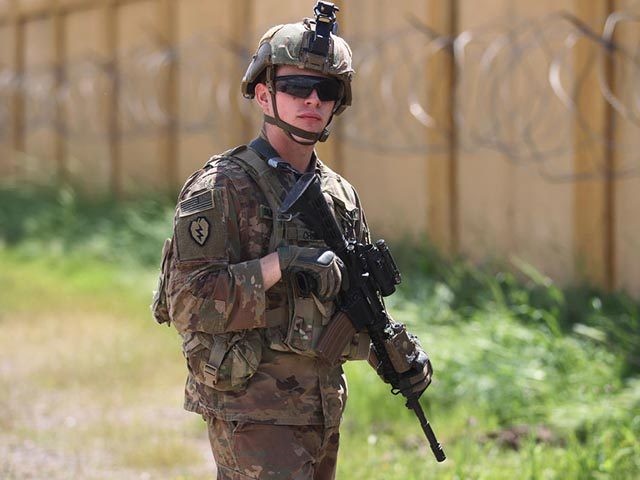Shiite Muslim militia groups in Iraq offered on Sunday to halt their attacks on U.S. and coalition troops if they agree to withdraw from Iraqi soil. The offer was made hours after a coalition convoy suffered damage from a roadside bomb south of Baghdad.
The offer of a truce came from Kataib Hezbollah (KH), the Iran-backed terrorist group whose founder Abu Mahdi al-Muhandis was killed alongside Iranian Gen. Qasem Soleimani by a U.S. drone strike in January. The strike was authorized because Soleimani was working with Kataib Hezbollah to launch rocket attacks against Iraqi bases where U.S. troops were stationed, and to attack the U.S. Embassy in Baghdad. One of the KH rocket attacks killed an American civilian contractor.
The Associated Press reported on Sunday that two other “factions from different Iran-backed groups” vaguely indicated their willingness to go along with a truce. A KH spokesman threatened continued violence if the offer is not accepted, saying that if the U.S. coalition does not withdraw its forces, “the resistance factions will resume their military activities with all the capabilities available to them.”
The same spokesman said the truce offer was promulgated by an umbrella organization called the “Coordinating Body of the Iraqi Resistance” after “major personalities intervened and mediated in order to persuade these factions to stop the bombing operations until the end of the American election.”
Those “major personalities” apparently intervened and mediated because Secretary of State Mike Pompeo threatened at the end of September to close the embassy in Baghdad and relocate diplomatic operations to the Kurdish city of Erbil unless the Iraqi government does more to protect American personnel from terrorist attacks.
The Iraqi government worries that other countries would follow suit if the U.S. closes its embassy. Iran’s Shiite proxies want the U.S. out of Iraq, but they apparently do not want the country to become entirely isolated from the world. They may also fear the outcome if the Iraqi government feels it must choose between the support of the Western world or Iran, whose ability to provide constructive support has been greatly diminished by sanctions.
Early analysis of Pompeo’s threat to close the embassy chided him for playing into Iran’s hands, but the militia’s new willingness to bargain suggests they no longer see it that way. Reuters noted that a “broad array” of Iraqi politicians called on Shiite militia leaders to “stop provoking the Americans,” fearing another major military intervention by the United States.
The Iran-backed Shiite warlords may also be growing nervous about their level of support from Iraqi Shiites. The top Shiite cleric in Iraq, Grand Ayatollah Ali Sistani, called on the militias to disband last month and advised the central government to stop funding the “Popular Mobilization Units” (PMU) — essentially bands of militia fighters deputized to fight the Islamic State on Baghdad’s behalf. Militia leaders largely ignored Sistani, especially Kataib Hezbollah, which is large and powerful enough to be seen as a government in its own right, just like the Islamic State was.
The similarity is not lost on Iraqis, especially Sunni Muslims, who have long feared abuse in Shiite-dominated regions and are uncomfortable with Iran’s influence over their government. Iraqi citizens also distrust the militia because they helped wage a violent crackdown against protesters last year, leaving over 500 dead and missing.
Voice of America News (VOA) speculated in September that the Iraqi militias are hoping to work out a deal with intervention-weary America similar to the one struck by the Taliban in Afghanistan. Kataib Hezbollah and other PMU forces took credit for forcing the reduction of U.S. forces announced in September and claimed they might be able to force a complete withdrawal with more attacks. Pentagon officials said the increased tempo of terrorist rocket attacks and bombings had no influence upon the drawdown decision.
Shiite militia leaders often cite a non-binding resolution calling on all U.S. forces to withdraw passed by the Iraqi parliament after the airstrike that killed Soleimani and Muhandis. Not everyone in Iraq was pleased by this resolution, with some denouncing it as more Iranian interference with their government. The resolution is becoming a political irritant for the militias, with critics arguing that if the fall of the Islamic State means the U.S. coalition is no longer needed in Iraq, then the PMU is also unnecessary and should be disbanded.

COMMENTS
Please let us know if you're having issues with commenting.